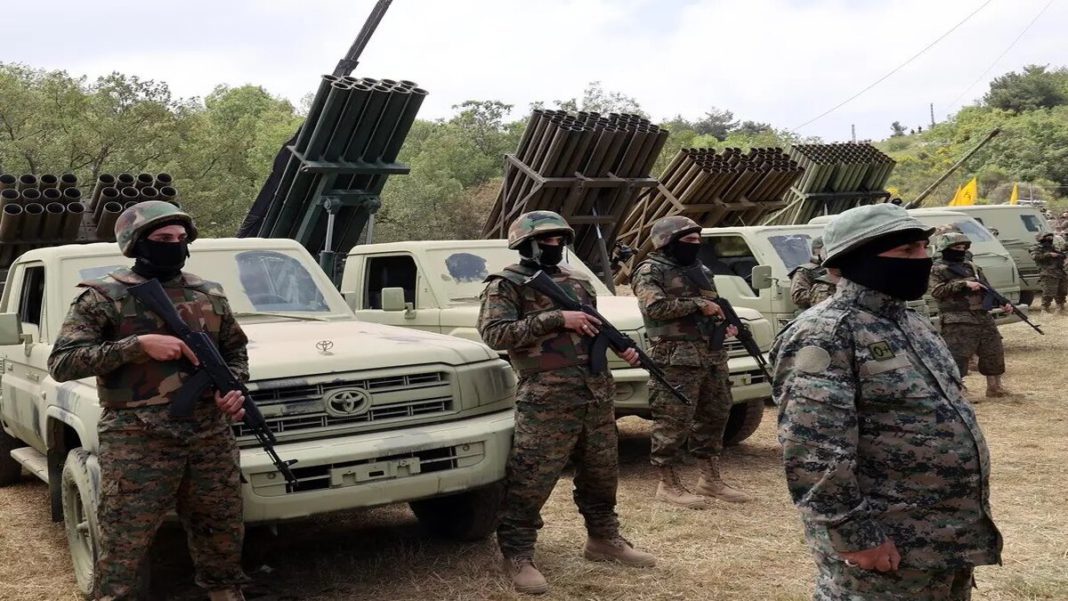LEBANON: Lebanon’s Hezbollah announced that it had attacked Israeli military positions in the disputed Shebaa Farms on Sunday, citing its actions as a show of solidarity with the Palestinian people following an unprecedented attack by Hamas militants from Gaza into Israel. In response, Israel retaliated with artillery barrages directed at southern Lebanon. There have been no recorded casualties.
With the support of Iran, this Shiite group has transformed from an obscure faction established during Lebanon’s civil war, which spanned from 1975 to 1990, into a heavily armed entity with significant influence over the Lebanese government. Governments, including the US, designate it as a terrorist organisation.
Origins
In 1982, Hezbollah was established by Iran’s Revolutionary Guards with the objectives of spreading the Islamic Revolution and combating the Israeli military presence in Lebanon. Embracing Tehran’s Shiite Islamist principles, Hezbollah was primarily recruited among the Lebanese Shiite Muslim population.
Military power
Hezbollah retained its weaponry after the civil war to confront Israeli troops stationed in the predominantly Shiite southern region. After years of engaging in guerrilla warfare, Israel eventually withdrew in 2000.
Hezbollah demonstrated its military prowess during a five-week conflict with Israel in 2006 that resulted in the kidnapping of two soldiers and the loss of lives. The war claimed the lives of approximately 1,200 individuals in Lebanon, primarily civilians, and 158 Israelis, predominantly soldiers. Hezbollah also launched a significant number of rockets into Israel.
Subsequently, its military strength expanded when it deployed to Syria in 2012 to assist President Bashar al-Assad in combating primarily Sunni rebel groups.
Hezbollah claims to possess precision rockets capable of targeting all regions of Israel. In 2021, the leader of Hezbollah, Sayyed Hassan Nasrallah, asserted that the organisation had an estimated 100,000 fighters.
Hezbollah receives both weaponry and financial support from Iran. According to U.S. estimates, Iran has been providing the group with hundreds of millions of dollars annually in recent years.
Regional sway
Hezbollah has strong connections with various Iran-backed groups across the region, such as Palestinian factions like Hamas and Islamic Jihad. During Saturday’s attack, Hezbollah claimed to be in “direct contact with the leadership of the Palestinian resistance.”
Hezbollah has provided training to Iran-backed groups in Iraq and has been involved in combat operations there. Saudi Arabia alleges that Hezbollah has also supported the Iran-affiliated Houthis in Yemen in a military capacity, a claim that Hezbollah refutes.
Role in Lebanon
Hezbollah’s role in Lebanon is grounded in its weapons arsenal and the backing of a significant Shi’ite constituency that believes that the organisation safeguards Lebanon against Israeli threats.
Lebanese parties opposed to Hezbollah contend that the group has weakened the state and accuse it of independently steering Lebanon into confrontations. The group holds positions in the government as ministers and has lawmakers in parliament.
In 2008, a power struggle emerged with Lebanese rivals supported by Western nations and Saudi Arabia, leading to a short-lived conflict. After the government pledged to take action against Hezbollah’s military communications network, Hezbollah fighters gained control of parts of Beirut.
Hezbollah became more active in politics in 2005, especially after Syria, its ally, withdrew from Lebanon following the assassination of former Prime Minister Rafik al-Hariri, who represented Saudi influence in Lebanon.
Subsequently, a U.N.-backed court convicted three Hezbollah members in absentia for the assassination. Hezbollah denies any involvement, describing the court as a tool of its adversaries.
In 2016, the Christian politician Michel Aoun, aligned with Hezbollah, assumed the presidency. Two years later, Hezbollah and its allies secured a parliamentary majority, which was later lost in 2022. Nonetheless, the group still held significant influence.
Hezbollah actively campaigned against a judge investigating the 2020 Beirut port explosion when he sought to question its associates. This standoff triggered deadly clashes in Beirut in 2021.
Accused in attacks on western targets
In the 1980s, groups that Lebanese security officials and Western intelligence have stated were associated with Hezbollah carried out suicide assaults against Western embassies and other targets, as well as abducted Western nationals. Imad Moughniyah, a prominent Hezbollah commander who was slain in a car bomb in Syria in 2008, was believed to be the leader of Islamic Jihad.
The U.S. holds Hezbollah accountable for the 1983 suicide bombing that destroyed the U.S. Marine headquarters in Beirut, killing 241 Marines, as well as the suicide bombing of the U.S. embassy in the same year. In 1983, a suicide bombing occurred at a French barracks in Beirut, which resulted in the deaths of 58 French paratroopers.
Hezbollah leader Nasrallah stated in a 2022 interview that tiny groups unaffiliated with Hezbollah were responsible for the hostage-taking and attacks.
Terrorist designations
Hezbollah is designated as a terrorist organisation by Western nations, including the United States, as well as by Gulf Arab states like Saudi Arabia. In the European Union’s classification, Hezbollah’s military wing is labelled a terrorist group, while its political wing is not.
Argentina holds Hezbollah and Iran responsible for the 1994 bombing of a Jewish community centre in Buenos Aires, resulting in the loss of 85 lives, and for a 1992 attack on the Israeli embassy in Buenos Aires that claimed the lives of 29 people. Both Hezbollah and Iran deny any involvement in these incidents.
Also Read: Israel 1st Target, Entire Planet Will Be under Our Law, Warns Hamas Commander Mahmoud Al-Zahar



